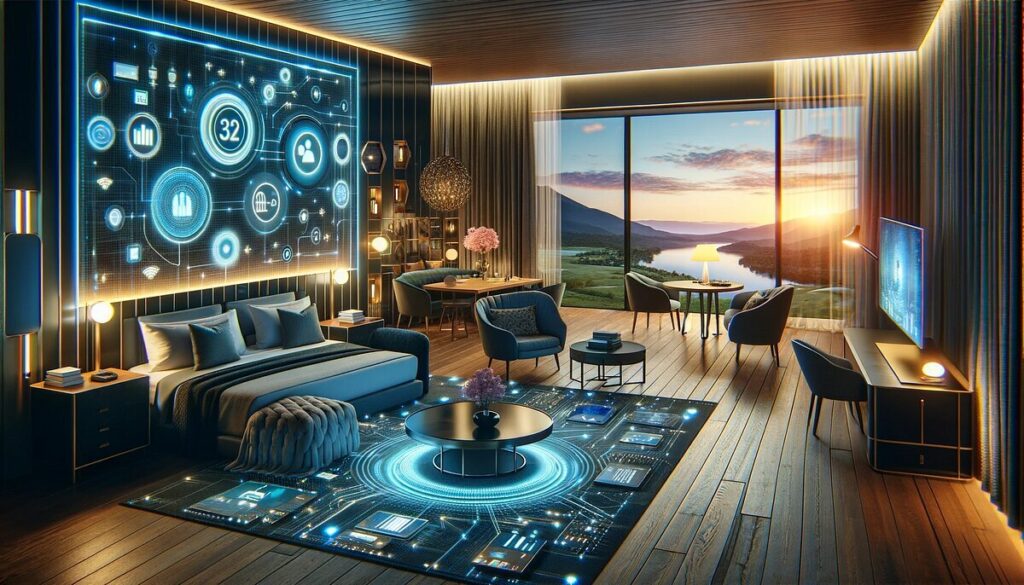Smart hotel rooms are revolutionizing the hospitality industry by integrating advanced technologies such as artificial intelligence (AI) and the Internet of Things (IoT). These innovations enhance guest experiences by allowing them to control various room features—like lighting, temperature, and entertainment—through connected systems.
Key Features of Smart Hotel Rooms
1. Connected Room Controls
Smart hotel rooms utilize connected devices that enable guests to manage their environment easily. For instance, smart thermostats allow guests to adjust the room temperature via smartphone apps or voice commands, ensuring a comfortable stay tailored to individual preferences. These devices can also automatically adjust settings based on occupancy, helping hotels save energy and reduce costs[1][2].
2. Voice-Activated Assistants
Integrating voice-activated virtual assistants, such as Amazon Alexa or Google Home, enhances the guest experience by providing hands-free control over room features. Guests can use voice commands to control lighting, adjust the temperature, and even access entertainment options like streaming services, making their stay more convenient and enjoyable[1][3].
3. Smart Lighting Systems
Smart lighting systems allow guests to personalize the ambiance of their rooms. They can adjust brightness and color to suit their mood or activities, whether working, relaxing, or preparing for a night out. These systems also contribute to energy efficiency by automatically adjusting based on natural light levels or turning off when the room is unoccupied[2][3].
4. In-Room Entertainment
Smart TVs in hotel rooms provide more than just standard cable channels. They offer access to streaming services, games, and social media, allowing guests to enjoy their favorite content just like at home. Furthermore, smart TVs can be integrated with other room technologies, enabling guests to control lighting and temperature through the TV interface[2][3].
5. Energy Management and Sustainability
Smart hotel technology promotes sustainability by optimizing energy consumption. Systems can monitor and adjust energy usage based on real-time occupancy data, leading to significant savings and a reduced environmental footprint. Hotels like Radisson and Hyatt are implementing such technologies to enhance their eco-friendly initiatives[1][2].
6. Remote Management for Staff
Hotel staff can remotely manage room features, preparing rooms for incoming guests without needing to enter them. This capability not only streamlines operations but also enhances guest satisfaction by ensuring rooms are set to optimal conditions upon arrival[1][2].
Conclusion
The integration of AI and IoT in smart hotel rooms is reshaping the guest experience, making it more personalized, convenient, and sustainable. As technology continues to evolve, smart hotel rooms are becoming a standard expectation among travelers, driving hotels to adopt these innovations to remain competitive in the industry[1][3].
Further Reading
1. Smart Hotel Rooms: Effective Tech Solutions for Hoteliers
2. https://sbit-hospitality.com/the-future-of-hospitality-12-smart-technologies-redefining-hotel-rooms/
3. Smart Hotels: What are Smart Hotels and What Technology do They Use?
4. The expanding role of cameras, sensors and AI-based technology in the future of hospitality | Spectrum Enterprise
5. Reshaping the Hospitality Industry with Smart Hotel Design


